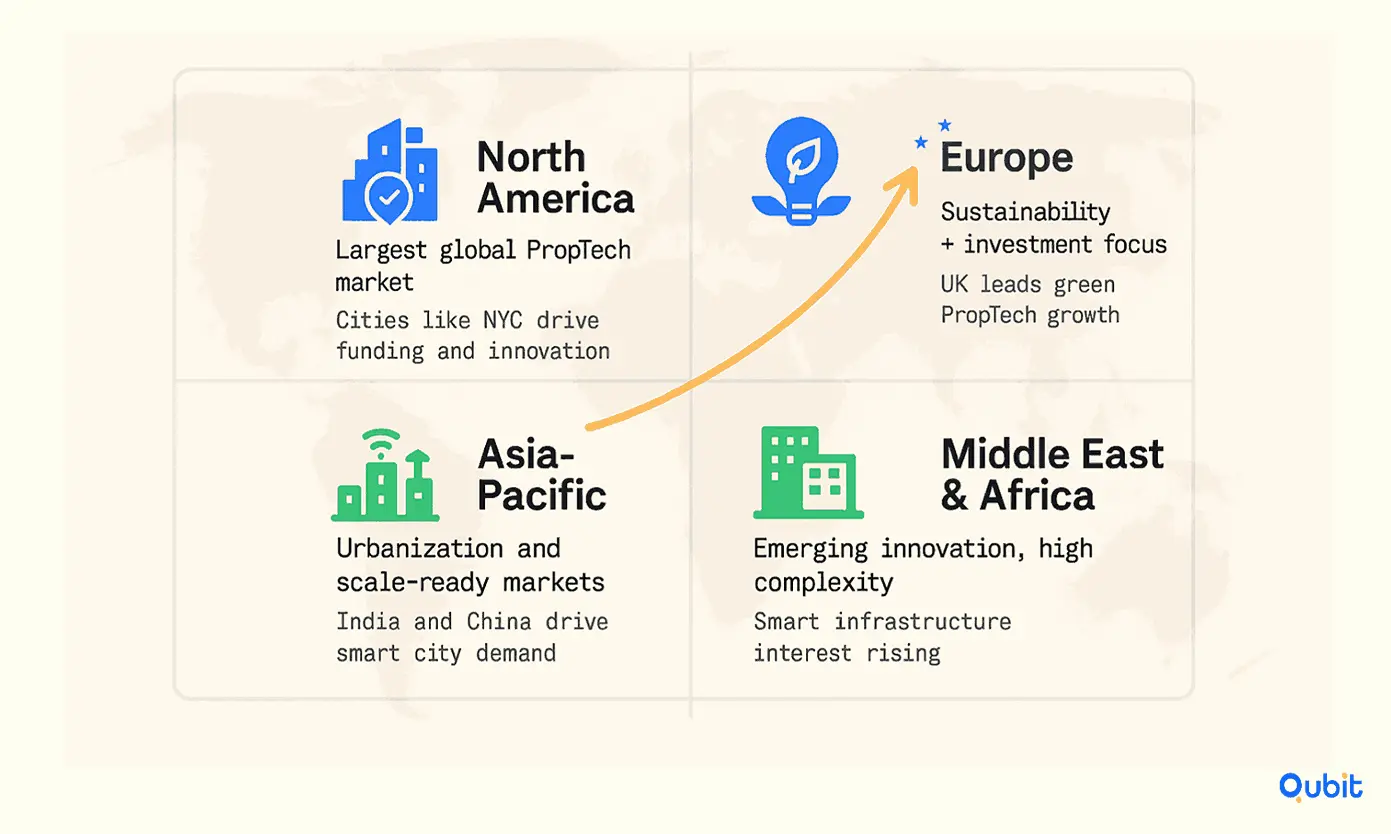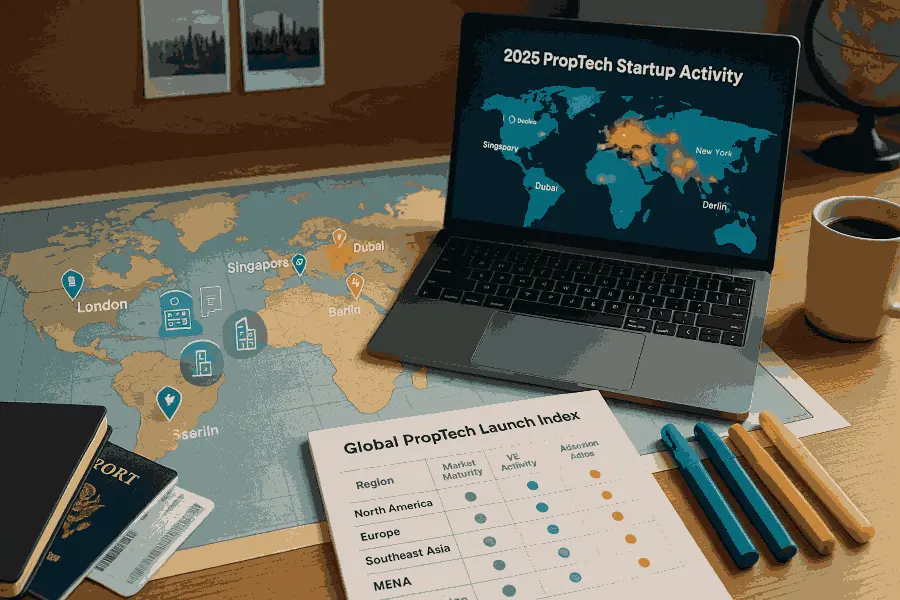The rapid evolution of PropTech is reshaping how the world interacts with real estate. As technology continues to disrupt traditional property markets, startups are finding innovative ways to address challenges and create value. This blog dives into the international PropTech landscape, offering insights into key markets and strategies for launching a successful venture.
Your exploration of regional PropTech opportunities is enriched by insights from the PropTech fundraising guide, which contextualizes financial strategies within broader market dynamics. From understanding market dynamics to tackling regional challenges, this article provides a roadmap for startups aiming to thrive in this competitive space.
Let’s jump right in!
What is PropTech?
PropTech, short for Property Technology, represents the innovative intersection of real estate and digital solutions. It encompasses a wide range of technologies designed to streamline property operations, from simplifying property listings to enhancing asset management processes. As industries worldwide embrace digital transformation, PropTech is reshaping how real estate professionals and consumers interact with properties.
The global surge in PropTech adoption is driven by several factors. Investors are increasingly drawn to its potential, pouring significant resources into startups and established firms alike. Cutting-edge technologies, such as artificial intelligence and blockchain, are being integrated to optimize efficiency and transparency. Meanwhile, evolving consumer expectations, such as the demand for seamless online experiences—are pushing the industry to adapt rapidly.
PropTech is not just about improving processes; it’s about redefining the real estate experience. By addressing inefficiencies and introducing smarter solutions, it’s paving the way for a more dynamic and responsive property market.
Regional Insights for PropTech Startups
Each region offers unique opportunities and challenges, shaped by factors such as market size, funding availability, regulatory environments, and innovation ecosystems.

North America: A Dominant Force in PropTech
North America stands as the largest PropTech market globally, driven by its robust real estate sector and advanced technological infrastructure. According to Fortune Business Insights, the region claims the largest PropTech market share worldwide, making it a prime destination for startups seeking established markets and high investment potential. Cities like New York serve as innovation hubs, fostering collaboration between startups and industry leaders.
Europe: A Thriving Investment Climate
Europe’s PropTech landscape is characterized by a strong investment climate and a focus on sustainability. The United Kingdom, in particular, has a proven track record in PropTech investment, as highlighted by Ascendix Tech. This region benefits from supportive policies and a growing demand for green technologies, making it an attractive option for startups prioritizing eco-friendly solutions.
Asia-Pacific: Rapid Urbanization Fuels Growth
Asia-Pacific emerges as a high-growth region, fueled by rapid urbanization and increasing digital adoption. Expert Market Research notes that this region offers expansive prospects for scaling PropTech ventures, especially in countries like China and India where urban development is accelerating. Startups entering this market can capitalize on the demand for smart city solutions and innovative property management technologies.
Middle East & Africa: Emerging Opportunities Amid Challenges
The Middle East and Africa present emerging opportunities for PropTech startups, despite regulatory hurdles. While the market is still developing, the region’s growing interest in smart infrastructure and real estate modernization creates room for innovation. Startups willing to navigate complex regulatory frameworks can tap into these promising markets.
A review of market patterns naturally connects with PropTech investment trends 2025, offering you a detailed perspective on evolving regional opportunities.
Quantitative Market Data and Regional Benchmarks
2025 PropTech Funding Distribution by Region
Regional funding patterns reveal distinct investment landscapes that directly impact startup strategy and resource allocation:
| Region | Total Funding 2024 | Number of Deals | Average Deal Size | Growth Rate |
|---|---|---|---|---|
| North America | $8.2B | 340 | $24.1M | 28% |
| Europe | $2.8B | 180 | $15.6M | 35% |
| Asia-Pacific | $2.1B | 220 | $9.5M | 42% |
| Middle East & Africa | $450M | 65 | $6.9M | 55% |
Regional Investment Preferences
European investors demonstrate strong preference for sustainability-focused PropTech, with 68% of deals including ESG components. Asian markets prioritize smart city integration, while North American investors focus on scalable SaaS models with proven unit economics.
Seasonal Funding Patterns
Q1 shows strongest activity in Asia-Pacific (45% above average), Q2-Q3 dominate in Europe, while North America maintains consistent deal flow year-round with slight Q4 uptick.
Challenges in Launching a PropTech Startup
Starting a PropTech venture is no small feat. Entrepreneurs in this space often encounter a unique set of hurdles, ranging from regulatory intricacies to the need for cultural adaptability. Understanding these challenges is the first step toward building a resilient and competitive business.
1. Regulatory Complexities
One of the most significant PropTech challenges lies in navigating the diverse regulatory frameworks across regions. Real estate laws vary widely, not only from country to country but often within states or provinces. For instance, compliance with zoning laws, data privacy regulations, and property transaction rules can be daunting for startups without legal expertise. Founders must prioritize seeking legal counsel early to ensure their operations align with local requirements.
2. Fierce Market Competition
The PropTech sector is teeming with established players and new entrants, making it a highly competitive landscape. Startups must contend with incumbents who have already captured significant market share and built strong customer trust. To stand out, innovation is key. Offering unique solutions or addressing unmet needs can help startups carve out their niche. Insights from the PropTech VC directory 2025 can also be invaluable, as it highlights potential investors who understand the challenges of competing in saturated markets.
3. Adapting to Local Preferences
Cultural and consumer preferences play a pivotal role in the success of PropTech solutions. What works in one market may not resonate in another. For example, a property management app designed for urban users in Europe might require significant adjustments to appeal to suburban communities in Asia. Localized strategies, including market research and partnerships with regional experts, can help startups tailor their offerings effectively.
4. Financial and Valuation Disparities
Understanding the financial dynamics of different regions is another critical factor. Valuation benchmarks can vary significantly, impacting funding opportunities and investor expectations. The PropTech valuation benchmarks provide a detailed comparison of funding stages and valuation trends, offering startups a clearer picture of how to position themselves financially.
Overcoming these challenges requires a combination of strategic planning, adaptability, and a deep understanding of the market. By addressing these obstacles head-on, PropTech startups can build a solid foundation for long-term success.
Strategies for Success
Expanding into the PropTech space requires a thoughtful approach to overcome regional challenges. By focusing on strategic partnerships, scalable technology, and cultural adaptation, businesses can unlock sustainable growth and attract investor interest.
1. Forge Strategic Local Partnerships
Collaborating with established entities in your target region can significantly enhance your market entry. Local partnerships provide access to valuable networks, regulatory insights, and customer bases. For example, start small in a region with a strong PropTech ecosystem by researching areas with robust networks to pilot test your solution. This approach minimizes risk while building credibility in the market.
2. Prioritize Scalable Technological Solutions
Technology plays a pivotal role in ensuring rapid scalability across diverse markets. Successful PropTech ventures often calculate regional ROI for their solutions by comparing potential cost savings with local overheads to justify expansions. This data-driven approach not only optimizes operations but also ensures that resources are allocated effectively.
3. Adapt to Cultural Nuances
Tailoring your offerings to align with local cultural preferences is essential for customer retention and brand loyalty. Understanding regional behaviors, communication styles, and property trends allows businesses to craft solutions that resonate with their audience.
By combining these strategies, PropTech businesses can position themselves for long-term success while addressing the unique challenges of regional markets.
Conclusion
Expanding a PropTech startup globally requires a blend of strategic planning and adaptability. By focusing on regional market insights, addressing potential challenges, and implementing actionable success strategies, startups can position themselves for sustainable growth. The importance of data-driven decision-making and tailoring approaches to local markets cannot be overstated. These practices ensure that businesses remain relevant and competitive in diverse environments.
If you're ready to take your PropTech venture to the next level, we can assist in securing the funding you need. Explore our Fundraising Assistance service at Qubit Capital to kickstart your journey. Let’s work together to transform your vision into a global success story.
Key Takeaways
- Global market analysis reveals diverse opportunities for PropTech startups.
- North America dominates in market share, while Europe and Asia-Pacific offer unique advantages.
- Regulatory climates and local cultural nuances profoundly impact market entry strategies.
- Building local partnerships and leveraging scalable technology are crucial for success.
- Data-driven insights and targeted investor strategies enhance global expansion prospects.
Frequently asked Questions
What are the best cities for proptech startups?
Cities with thriving tech ecosystems, favorable regulatory environments, and active investment communities are ideal for proptech startups. North America and leading European hubs often stand out due to their innovation-friendly infrastructure and access to venture capital.






